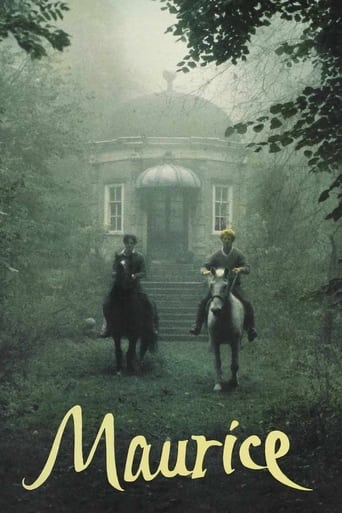iza8868
First of all, I can't believe this movie was made in 1987!This has more passion, emotion and sensuality in it than most romance movies of the 2000's. This bittersweet but tender love story managed to get my attention all along (I didn't even notice that it's longer than an average movie-140 min.) and marvelously get's it's message across without being too explicit. This highly emotional love story is built around three characters and explores the problem of homosexuality in 19th century England. The main character is Maurice Hall,as the title suggests, who comes to terms with his sexuality, when love develops between him and his college best friend, Clive Durham. After rejection, deception and huge efforts to become what is considered "normal", he finally finds comfort in the arms of the Durham household's gamekeeper. Although all the performances were excellent, it was Alec Scudder's character that I found the more interesting. Rupert Graves did an excellent job portraying this rough yet sensitive country boy, who's sincere love for a high class gentleman seems impossible at first. A bit brash, yet charming, this low class lad falls desperately in love with Mr. Durham's (almost) permanent guest, who initially, despite Scudder's numerous signals, doesn't seem to remark his more than obvious affection. His glances, the clumsy conversations, the overjoyed remark that Scudder makes after Mr. Hall's unexpectedly quick return to the estate, as well as the passionate love letters addressed to Maurice after their first "sharing", show the honesty and depth of Scudder's affection, excluding any chance of blackmailing and desire for profit - as both the viewer and Maurice might have suspected. Compared to Clive Durham, who is unable to face his sexuality and hides behind a hollow marriage, Scudder stands as a vivid character, comfortable with who he is,and who's faithfulness and unconditional love manages to win Maurice's heart.
Michael Neumann
Growing up gay in puritan England circa 1920 could be a very dangerous enterprise, as two young college students discover in this adaptation of E.M. Forster's suppressed, confessional novel. Of course by now it's no secret how the cloistered male community and heady, highbrow atmosphere of England's best public schools drew out "the unspeakable vice of the ancient Greeks" from much of the country's youth, but this isn't the usual timid introduction to homosexual love. Beneath the typically lush Old World settings and handsome period décor is a challenging story of one (sadly, rather bland) young man caught between the law and his libido. Platonic lover Hugh Grant has a much more interesting character; unfortunately, he all but disappears from the script after being frightened by the threat of exposure into a dull heterosexual marriage. It's up to Maurice (pronounced Morris) to carry the torch, in more ways than one, and his coming to terms with an errant (by British law) sexuality is conveyed with literate sympathy.
bkoganbing
E.M. Forster (1879-1970) as a gay man lived long enough to see the Stonewall Rebellion happen across the pond the year before his death at the age of 91. Though close friends knew he was gay, as prescribed by the mores of the times, Forster led a quiet, discreet, and circumspect life. He was not a political person, first and foremost he was a novelist, though in his writings you can some trenchant comments about the political, never more so in his A Passage To India.My guess is that if Stonewall didn't happen here and other developments such as the Wolfenden report recommending decriminalization of homosexuality in the United Kingdom hadn't happened, Maurice might never have seen the light of day. My guess is that Forster would have opted for a time capsule, hoping this novel of young same sex love would see the light of day in more enlightened times. He got to see those enlightened times come before he died, so Forster's novel Maurice was published in 1971 and came to the screen in 1987. Forster's protagonist is Maurice Hall a young man with some unwanted gay feelings, unwanted because at the time those things were not discussed. Young Maurice forms an attachment with school chum Clive Durham. To put it in more modern terms they're the British boarding school equivalent of Ennis Delmar and Jack Twist. And they view their relationship differently as did Jack and Ennis. Maurice truly hates the stifling conformity of Edwardian Great Britain, but Clive wants to put it behind him, get married and do as proper British society demands of him. James Wilby is Maurice and Hugh Grant in one of his earliest roles is the shallow Clive. Maurice takes a path that E.M. Forster took in life as a gay man, as open as he could be, but most discreet. I do wonder who the Clive character was based on. I also wonder if in the future, the proper Mr. Clive might have been giving the toe tapping signal in some bathroom stall looking to satisfy his real and closeted lusts.There is also a great performance by Rupert Graves as Alec Scudder the stable-hand at Clive's estate who Maurice eventually does establish a relationship and some measure of happiness. It will be a tough road for them, not very many places on the earth will be that hospitable in the years just before World War I.Maurice was written around 1910, a decade or so after the Oscar Wilde scandal and six years before Roger Casement's diaries were opened to the public to justify hanging him as a traitor in the Easter Rebellion. The gay baiting there was a deliberate tactic by the British government to shake popular support away from the rebels in Ireland. These were not good times for Gay/Lesbian/Bisexual/Transgendered people. E.M. Forster wrote the novel and tucked it away. It's a beautiful work and a beautiful film made from same. I'm glad in the final couple of years of life, Forster saw the more enlightened times come so we could have a glimpse of what life was like for a young gay male in Edwardian Great Britain.
mikrofon72
This movies beautifully illustrates the love between 2 men and their struggle against selfacceptness, hatress and lack of freedom in a society that doesn't allow them to live, and to be free beings and be as they are. In a society, that would rather see men fight and kill each other, than to see them embraceing. Its about the misery, fear and mistrust it causes for all when you are forced to live a life that isn't right for you.Few movies understand how to bring the message and give a impression like its really happening. This one does. It succeeds in showing what love between 2 men can be.The scenery of the movie is like taking a glimpse into the past around 1910 in England and makes you feel right there.








